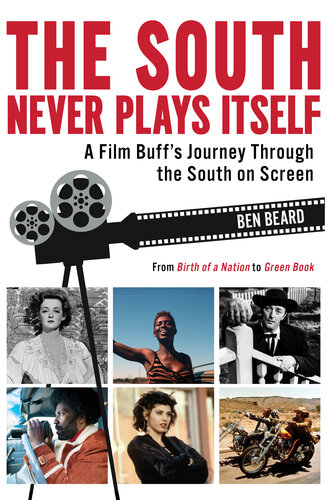
The South Never Plays Itself
A Film Buff's Journey Through the South on Screen
کتاب های مرتبط
- اطلاعات
- نقد و بررسی
- دیدگاه کاربران
نقد و بررسی

September 14, 2020
Former film critic Beard (Muhammad Ali: The Greatest) seeks to map the on-screen American South in this expansive but ultimately thin work. Beard starts with D.W. Griffith’s silent The Birth of a Nation, which, in simultaneously codifying many basic techniques of film storytelling and upholding an anti-Black, pro-Confederacy view of American history, demonstrates how “Hollywood was built on a movie that perpetuated” long-standing Southern myths. This provocative starting point goes nowhere, though, and Beard proceeds to discuss a dizzying array of films, many unrelated or tangential to his main theme, such as the Chicago-set horror film Candyman. Adding to the scattered feeling, Beard employs multiple organizational schemes, devoting some chapters to notable Southern writers (William Faulkner and Tennessee Williams), and others to the representation of individual states (Louisiana, Texas, and Florida) or to the films made during Southern-born presidents’ terms. A closing chapter places a commendable focus on Black filmmakers, but loses sight of the Southern theme altogether. Cinephiles may appreciate Beard’s enthusiasm and energy, but few will be surprised when he concludes: “I’m not sure I’m any closer to understanding the South at the end than I was at the beginning.”

November 1, 2020
Inspired by the documentary Los Angeles Plays Itself, Beard (Muhammad Ali: The Greatest) here views the history of the South through the lens of Hollywood and the history of American movies via their depictions of the South. Beard, a born and bred Southerner, begins with an overview of his lifelong interest in cinema, from watching films with his father to making VHS movies with friends. He traces the genesis of the concept of "the South" to the post-Civil War Reconstruction, illustrating the role the movies played in cementing the Civil War-era South in the American cultural imagination and tracing the development of the filmic South through Southern gothic, horror, noir, music, comedy, and Black cinema. Throughout the text, Beard returns to discussions of race and examines the interplay between the filmic South and the real South, once asking, "Did the movies create my beliefs, or did beliefs like mine create the movies?" Beard knows how to turn a phrase, and his prose is conversational, blending personal tales and family history into his critical analysis of the South on film. VERDICT Recommended for film buffs and those interested in a reflective, nonacademic examination of race and film.--Monica Howell, Northwestern Health Sciences Univ. Lib., Bloomington, MN
Copyright 2020 Library Journal, LLC Used with permission.

September 15, 2020
A wide-angle take on images of the American South in film. Beard, who has written reviews for a variety of publications, aims to examine depictions of the South on film, but the resulting narrative is scattershot and cursory. Most fundamentally, for all of the many incidental comments about the South, the author never establishes a central, foundational thesis on the topic. Beard tosses about scores of adjectives, usually negative, about the South--for example, Tennessee Williams' view of the region was "haunted, sybaritic, oppressive, and strange"--but does he agree with these depictions? Does Beard find the South a place of "heat, sex and languor" as depicted in A Streetcar Named Desire? Some of the author's commentary suggests that he does, but he must state it more directly and cogently. Beard's survey of relevant films is wide-ranging, moving from Birth of a Nation to No Country for Old Men and beyond--but the analysis lacks insight. The author's discussions of specific films lean heavily on plot summary, which often veers off topic. For example, a consideration of the James Bond film Live and Let Die wanders into general remarks about other 007 films. The tools and language of film criticism are largely absent, as Beard offers little detailed examination of shot composition, editing, scoring, direction, and performance to support his boldly stated opinions. However, some bright spots exist. A chapter on films set in Florida, where the author spent his formative years, has the detail and commentary other chapters lack. Some phrases hit the mark. As a Southern senator in Advise & Consent, Charles Laughton is "a slow-moving serpent, deadly, unforgiving, and always ready to strike." Elsewhere, though, unnecessary profanity betrays a challenged critical vocabulary. Beard judges Oliver Stone's JFK, certainly a highly flawed movie, as "a hot fucking mess" featuring "a shitload" of actors. Wait for the remake.
COPYRIGHT(2020) Kirkus Reviews, ALL RIGHTS RESERVED.

























دیدگاه کاربران